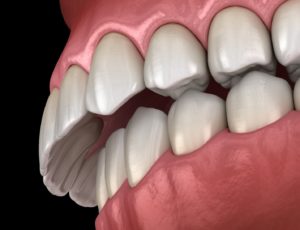
Has your dentist informed you that you have a “bad bite” or malocclusion? While many people do not give much thought to the way their teeth come together when they chew or bite, this is actually a huge part of oral and overall wellness. Let’s talk about what exactly a bad bite is, what can cause a bad bite, and how your dental team may use combined orthodontic-surgical treatment to address it.
What Is a Bad Bite?
The terms “bad bite” and “malocclusion” are general ways to refer to problems with the way the upper and lower teeth come together. Examples of malocclusion include:
- Overbite – The upper teeth protrude over the lower teeth
- Underbite – The lower teeth protrude beyond the upper teeth
- Crossbite – Some of the upper teeth sit inside the lower teeth
- Open bite – The front teeth do not come together when the back teeth are making contact
Not all cases of malocclusion are equally serious. Some individuals with minor flaws in their bite do not require treatment. However, severe malocclusion can seriously affect a person’s dental health, putting them at an increased risk of TMD, gum disease, and decay. Their facial aesthetics may also be adversely affected.
What Causes a Bad Bite?
Malocclusion usually occurs due to problems in the size or shape of the jaw or teeth. Such issues may be hereditary, but other factors can also contribute to a bad bite, including:
- Tooth loss or extra teeth. Tooth loss can cause changes to the jaw shape and allow the remaining teeth to drift out of place. Extra teeth lead to crowding that affects occlusion.
- Prolonged pacifier use or thumb sucking in childhood. These habits can affect the way the jaw develops.
- Trauma to the jaw. Traumatic injuries may heal in a way that results in changes to a person’s bite.
Treating a Bad Bite
An orthodontist has completed extensive training in occlusion and is the best person to design a treatment plan to correct your bad bite. Depending on the nature and severity of your problem, they may recommend:
- Braces to correct the position of the teeth
- Extractions to address overcrowding
- Surgery to reshape the jaw
- Slightly reshaping teeth to affect they way they fit with the teeth directly across from them
In some cases, two or more of the above-listed treatments come together to produce the best results. For example, in combined orthodontic-surgical treatment, you may undergo orthodontic treatment both before and after jaw surgery. While that prospect might seem a little intimidating, you can be confident that the end result will reduce your risk of future dental problems and may even improve your facial aesthetics.
A bad bite is bad news! But there is good news as well — you may be eligible for treatment to improve your smile’s health and appearance.
Meet the Practice
Under the leadership of Dr. Amin Mason, Columbus Orthodontic Center provides treatment for malocclusion and a range of other orthodontic problems. He often partners with a trustworthy local oral surgeon to provide combined orthodontic-surgical treatment. To learn more about our practice and how we may be able to serve you, contact us at 614-549-5835.

